Yemen Slides into the Horrors of Famine
MIDDLE EAST AND NORTH AFRICA, 12 Nov 2018
War-torn Yemen is experiencing the disastrous collapse of its currency. Food, fuel, medication and clean water is becoming astronomically expensive. The result is a looming famine that could become one of the biggest ever.

A Yemeni child suffering from severe malnutrition is weighed at a hospital in northwestern Yemen. Aid groups warn that if something isn’t done quickly, as many as 14 million people could be facing famine. (Photo by ESSA AHMED / AFP)
9 Nov 2018 – The soldiers standing with their machine guns can’t see us behind the mirrored windows of the SUV as we speed past. A long succession of pickup trucks line the road along the shore, with men in uniform standing at the ready behind the MGs mounted in their beds.
They have been sent to shoot at demonstrators should the need arise — the very demonstrators we would like to speak with. The authorities, however, have not allowed for that degree of transparency for our trip. The governor of the country’s largest province, Hadramawt, invited journalists to demonstrate how safe and quiet the capital of Mukalla is, that the port is in operation, that oil exports continue and that there is a Yemen beyond the artillery and gunfire.
At least until the third day of our stay.
It’s the beginning of September, and since early in the morning, hundreds of demonstrators have been out and about despite the searing heat, burning tires and blocking roads. “Tear gas?” In our car, the official minder — who has declined to indicate which side he is on — laughs bitterly. “We don’t have any. Only clubs. Otherwise, it’s gunfire.”
People aren’t just taking to the streets in Mukalla. They are also protesting in the southern metropolis of Aden and in the national capital Sanaa against their living conditions. They are demonstrating on both sides of the front against an adversary that has proven almost as deadly as the armed conflict itself: the collapse of the country’s currency.
The Yemeni rial is in freefall, having lost almost three-quarters of its value against the dollar since the beginning of the war — meaning there is less and less left over from the paltry salaries to at least buy bread, rice and vegetables. More than 90 percent of all foodstuffs must be imported to Yemen in exchange for hard currency.
Those in power on both sides of the conflict have reacted similarly. The Houthi rebels in Sanaa arrested dozens of protesters while the exile government of Abd Rabbu Mansour Hadi beat marchers and opened fire on them. The Houthis closed down currency-exchange kiosks; Hadi fired his prime minister in October and raised interest rates. Saudi Arabia has announced it was sending $200 million (176 million euros) in aid money, but none of that can ward off the approaching disaster.
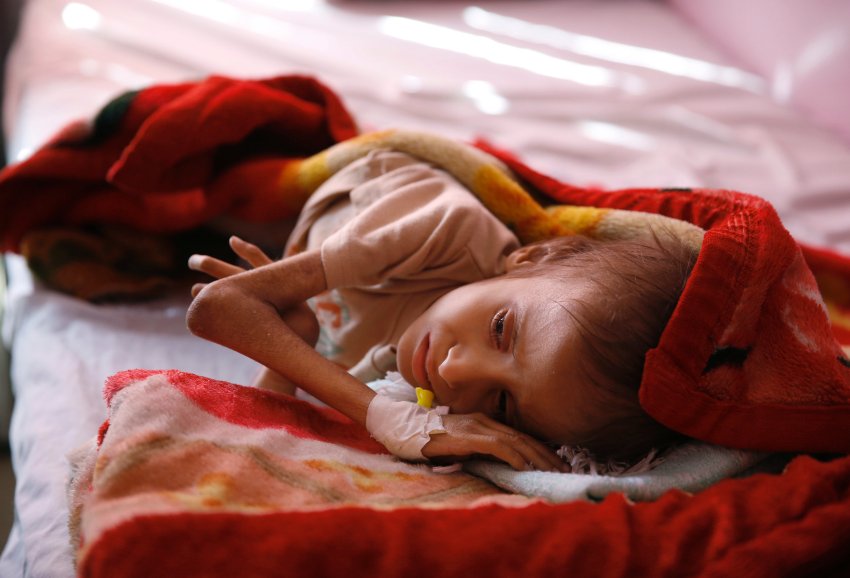
Severe malnourishment has been particularly bad in the countryside, with many families no longer able to afford the journey to hospitals in the city. (Photo by ESSA AHMED / AFP)
Selling Whatever They Can
“There is now a clear and present danger of an imminent and great big famine engulfing Yemen: much bigger than anything any professional in this field has seen during their working lives,” Mark Lowcock, the top UN coordinator for humanitarian relief, recently told the Security Council. Food, diesel for hospital generators, fuel for cars, water for drinking and cleaning, trash removal: All of that must be paid for with money that is worth less and less. And whether it is gold, land, cars or furniture, people have long since sold whatever they can to survive.
We know the war in Yemen from the images of bomb craters, injured babies in crumbling hospitals, dead bodies and rubble. But behind the horrors of battle lies a frequently overlooked danger that is just as deadly.
Since the coalition under the leadership of Saudi Arabia and the United Arab Emirates began trying to push back the Shiite-connected Houthi rebels, with a heavy reliance on air strikes, more than 15,000 people have been killed in the violence. But many more — tens of thousands, according to estimates — have likely died from starvation, cholera and as a consequence of the catastrophic healthcare situation.
And it isn’t because there is no food or medication in the country. The fates of many Yemenis — on both sides of the front — have been sealed by the collapse of their spending power. The northwest of the country, under control of the Houthis, is largely isolated, but even in population centers like the port city of Mukalla in the south, where no bombs have fallen and where the alliance of the ultra-rich Gulf states are supposed to be guaranteeing stability, crisis is looming.
At the only state-run maternity hospital within hundreds of kilometers, fear can be heard in the voice of Dr. Abha Bawaida, a senior hospital official. “Soon, we won’t be able to continue. Already, we have 40 births a day. Women are waiting at the entrance, begging us for help.” Expecting mothers used to be able to go to private clinics, but they have become unaffordable. “Even pharmacists are now only selling us drugs for dollars or Saudi Arabian riyals.”
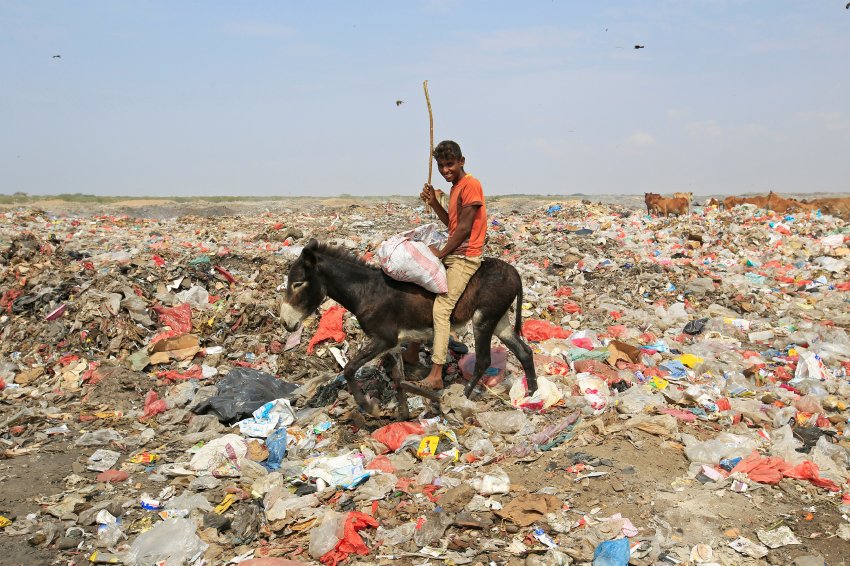
A boy collecting recyclables from a garbage dump near the port city of Hodeida. For years, the country’s central bank paid the salaries of Yemeni civil servants. Two years ago, however, the government supported by Saudi Arabia dismantled the central bank and moved it to Aden. Since then, government employees have received very little. (Photo by ESSA AHMED / AFP)
‘Afraid of Starving to Death’
A bleeding man is lying in the emergency room with his son. Not a typical patient for a maternity hospital, he was at the demonstration and made his way here after being beaten in the head by soldiers. Forty years old, his name is Anwar Ali and he works in Mukalla’s last remaining tuna-canning facility. “A sack of rice costs twice as much as it did just one month ago, but my salary has not gone up,” he says. “It’s not enough anymore. Officials have told us they can’t do anything about the inflation. So we took to the streets. We are afraid of starving to death.”
Mukalla’s future has long since become reality in the countryside controlled by the Houthis. Among listless children with sagging skin and bloated bellies, Dr. Mekkia Mahdi tries to save those who often can no longer be saved, including 11-year-olds who only weigh as much as newborns. “Since the beginning of this week, four small children have died, one per day,” she tells DER SPIEGEL. The doctor in the hospital in Aslam, located in northeastern Yemen, is surprised about the amount of global attention being paid to the murder of Saudi Arabian dissident Jamal Khashoggi “as millions of Yemeni children are suffering. Nobody cares about them.”
Only those who can still afford the trip from their villages to the city, journeys which have become astronomically expensive, even show up in Mahdi’s hospital. Fully 8 million people are dependent on food aid. Of 2 million undernourished children, 400,000 are in critical condition, with UN experts forecasting that another 100,000 will join them during just the next few months. On Wednesday, 35 Yemeni and international NGOs called for an “immediate cessation of hostilities” in Yemen, where they warned 14 million people, or half the population, were now “on the brink of famine.”
Yemen has always been poor. But the collapse of the country’s currency is accelerating to the point that even hard currency from aid organizations isn’t making it into the country, while dollar-based revenues raked in by state-run oil exports are flowing into accounts in Saudi Arabia, is a catastrophe that fell from the heavens.
Both sides, the Houthis as well as Hadi’s government-in-exile and its Gulf-state protectors, use the suffering as a weapon. The currency collapse, though, can be blamed on a decision made by Saudi-allied President Hadi over two years ago, the consequences of which are only now making themselves felt: the disempowerment of the country’s central bank. The bank had been responsible for much more than currency stability and monetary policy. It also managed the state’s payroll, paying the salaries of 1.2 million civil servants, police officers and soldiers. Over 6 million people were dependent on those payments.
Even after the civil war began, the bank continued doing that, in addition to paying international debts and overseeing the country’s shrinking reserves of hard currency. In short, the bank tried to save the country. Even soldiers on opposing sides of the front continued to receive their pay, as long as they had joined the military by 2014. Teachers, policemen, administrative officers, doctors and nurses across the country reliably received their salaries. Despite the violence, every few weeks a military transport aircraft, or one of the aging jets belonging to the national airline Yemenia, would take off from Sanaa for Aden in the south — loaded with cash.
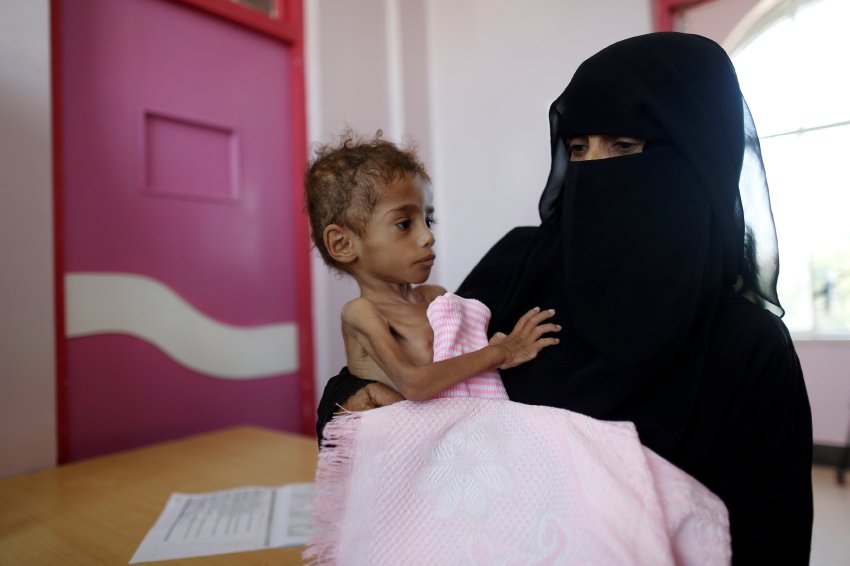
A woman holding her malnourished son at a treatment center in Sanaa. Aid groups warned on Wednesday that half the population face starvation. (Photo by ESSA AHMED / AFP)
A Catastrophe Gripping Yemen
On the one hand, it was crazy. On the other, Yemen’s central bank was the most important institution for later returning the state to functionality. It was the only organization that could prevent the army from disintegrating into militias that would resort to robbery, extortion and plundering once the main fighting came to an end, as is so often the case in such conflicts.
The central bank’s actions were largely thanks to one man: Central Bank Governor Mohammed Bin Humam. When President Hadi sidelined him and brought the bank under his own control in 2016 before moving it to Aden, he set in motion the catastrophe that now has Yemen in its grip.
At the time, Bin Humam warned that the state would collapse and returned to the town of Ash Shihr, an hour’s drive east of Mukalla. Which is where we found him, sitting on a red sofa in his family home, which is neither meager nor extravagant. His voice sounds muted. He doesn’t really want to talk, but a former member of his staff, Mansour Rageh, today the chief economist of the Sanaa Center for Strategic Studies, has come along, so Bin Humam agrees to give his first interview in two years.
He joined the central bank’s board of directors in 1990 before rising to the very top in 2010. When the Gulf state coalition began bombing Sanaa and Aden in 2015, he remained in Sanaa. “But then, when one of these Houthi revolutionary committees marched into my office and proclaimed that they controlled everything from that point on, I nodded politely,” Bin Humam says. He says he told them that they were welcome to take over the central bank, but that he wouldn’t remain at his post.
Bin Humam traveled to Riyadh and Washington, negotiated with the International Monetary Fund and the World Bank. Everyone promised him they would continue to protect the independence of the Yemeni central bank. But they didn’t fulfill those promises. Saudi Arabia didn’t want stability, they wanted victory.
When the Saudi offensive — initially conceived as an operation that would take mere weeks — still hadn’t produced the desired results after a year, Riyadh pivoted to using starvation as a weapon. Starting in June 2016, President Hadi ceased sending revenues from the conquered oil fields to the central bank, transferring the money instead to an account in a Saudi Arabian bank. That July, he gave the order to cut the central bank’s access to all hard-currency accounts abroad. Then, on September 18 of that year, he removed Bin Humam and moved the bank to battle-plagued Aden — allegedly to protect its independence.
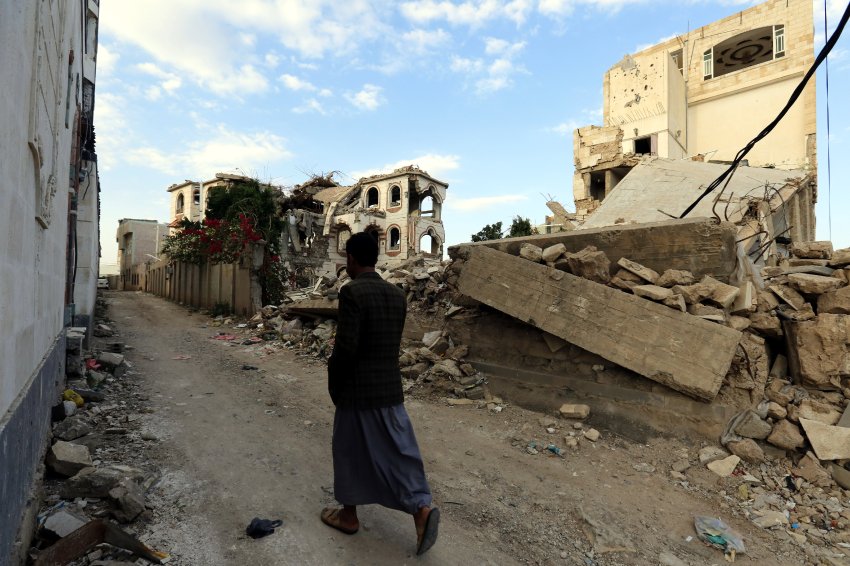
A man walks past buildings in Sanaa destroyed by a Saudi-led air strike. (Photo by ESSA AHMED / AFP)
Not Even a Crane
Just days later, he said: “It may be that we will no longer be able to pay the salaries of state employees.” Hunger as a weapon. In the Houthi-controlled areas, civil servants have only received just short of four-months’ salary in the two years that have since elapsed.
Transferring the central bank to Aden was akin to breaking it up. For an entire year after its arrival in Aden, the new bank didn’t even have a SWIFT code, meaning it had no access to the global money-wiring system. And the oil revenues continued to make their way into the account in Saudi Arabia. Bin Humam’s successors had only one recipe for addressing the currency’s ongoing loss of value: printing more of it, hundreds of billions of rials. “We are stumbling into a catastrophe. The inflation can get a lot worse,” says Bin Humam. Of the $2 billion in aid that Saudi Arabia pledged in early 2018, only around $20 million has actually been dispersed, the rest is still in accounts in Saudi Arabia.
Mukalla, a city sandwiched between desert mountains and the Indian Ocean, should actually be a boomtown. It is far away from the fighting front and its port is the last one in the country that could actually remain functional. But it doesn’t even have a crane for unloading containers.
Governor Faraj al-Bahseni, a former soldier with a reputation for integrity, says he doesn’t get anything at all from the government, adding that he is paying all salaries for teachers, doctors and civil servants from his own budget — a budget fed by paltry customs earnings in addition to a fifth of the oil revenues from Hadramawt Province.
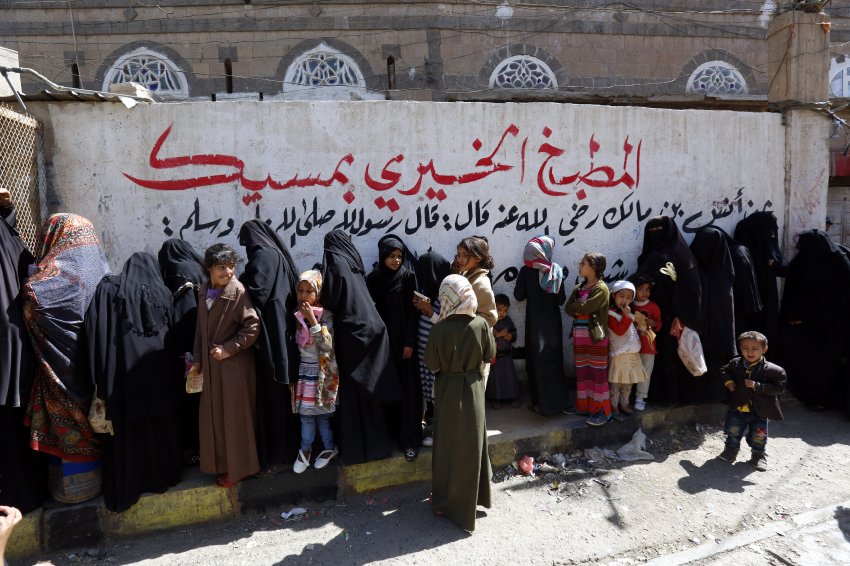
The country’s currency has collapsed as salaries have remained stagnant, making food unaffordable for thousands of families. Here, women and children wait in line in Sanaa in early November to receive food rations from a local charity. (Photo by ESSA AHMED / AFP)
‘They Can Save the Country’
Martin Griffiths, UN special envoy for Yemen, now also sees the ongoing economic collapse as the greatest danger facing the country. “There is no doubt in my mind whatsoever that this economic issue is now the overwhelmingly most important priority,” he recently told Reuters. “Within the UN we’re talking about the need for a master plan … an immediate set of measures over weeks which the World Bank, IMF, UN agencies, the Gulf obviously, the government of Yemen could come together to discuss.”
Early last week, U.S. Secretary of State Mike Pompeo demanded peace negotiations to begin within 30 days to finally put an end to the conflict. Following the brutal murder of Khashoggi, the Saudi regime opponent, the U.S. is now ratcheting up the pressure on Riyadh.
The man who sought to prevent the catastrophe everyone could have predicted is still sitting in his living room in Ash Shihr. The bitterness in Bin Humam’s voice is impossible to miss as he issues an appeal to the world. “If the international community wants to, it can stop the fall. If it reestablishes a genuinely independent central bank and ensures that oil revenues are paid into it, that civil servants are paid, and if they stabilize the rial with something closer to $4 billion rather than $2billion, they can save the country.”
Pause.
“But do they really want to?”
__________________________________________________
Related SPIEGEL links:
- The Forgotten War: A Visit to the Killing Fields of Yemen (09/25/2018)
- War in Yemen: In a Devastated Country, One City Is Thriving (11/15/2017)
DISCLAIMER: The statements, views and opinions expressed in pieces republished here are solely those of the authors and do not necessarily represent those of TMS. In accordance with title 17 U.S.C. section 107, this material is distributed without profit to those who have expressed a prior interest in receiving the included information for research and educational purposes. TMS has no affiliation whatsoever with the originator of this article nor is TMS endorsed or sponsored by the originator. “GO TO ORIGINAL” links are provided as a convenience to our readers and allow for verification of authenticity. However, as originating pages are often updated by their originating host sites, the versions posted may not match the versions our readers view when clicking the “GO TO ORIGINAL” links. This site contains copyrighted material the use of which has not always been specifically authorized by the copyright owner. We are making such material available in our efforts to advance understanding of environmental, political, human rights, economic, democracy, scientific, and social justice issues, etc. We believe this constitutes a ‘fair use’ of any such copyrighted material as provided for in section 107 of the US Copyright Law. In accordance with Title 17 U.S.C. Section 107, the material on this site is distributed without profit to those who have expressed a prior interest in receiving the included information for research and educational purposes. For more information go to: http://www.law.cornell.edu/uscode/17/107.shtml. If you wish to use copyrighted material from this site for purposes of your own that go beyond ‘fair use’, you must obtain permission from the copyright owner.
Read more
Click here to go to the current weekly digest or pick another article:
MIDDLE EAST AND NORTH AFRICA: